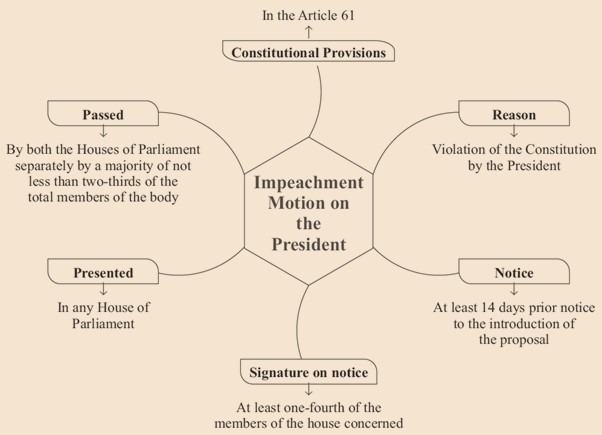President
Articles 52 to 78 in Part V of the Constitution deal with the Union executive.
Article | Subject |
Article 52 | The President of India |
Article 53 | Executive Power of the Union |
Article 54 | Election of President |
Article 55 | Manner of Election of President |
Article 56 | Term of Office of President |
Article 57 | Eligibility for Re-election |
Article 58 | Qualifications for Election as President |
Article 59 | Conditions of President’s Office |
Article 60 | Oath or Affirmation by the President |
Article 61 | Procedure for Impeachment of the President |
Election of the President
- The President is elected indirectly by an electoral college.
- The election uses the system of proportional representation by means of the single transferable vote and the voting is by secret ballot.
- This electoral college consists of the elected members of both Houses of Parliament and the elected members of the legislative assemblies of the states.
- The election utilises the system of proportional representation by means of the single transferable vote.
- The voting in the presidential election is conducted via secret ballot.
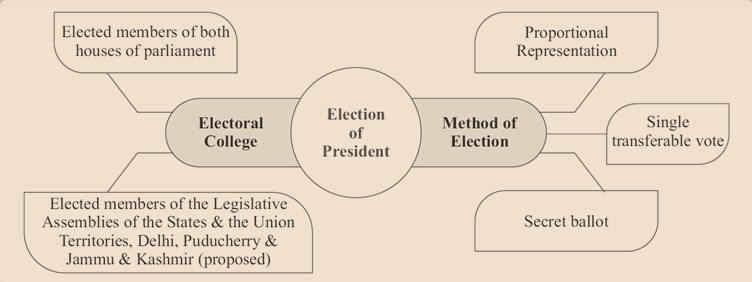
Eligibility Criteria, Swearing-in Ceremony, and Conditions of Office
- To be considered eligible for the high office of President, a candidate must fulfil several key criteria:
- They must be a citizen of India, demonstrating their allegiance to the nation
- The individual must have reached the age of 35 years or more, indicating a level of maturity and experience
- The prospective President must possess the qualifications necessary to be elected as a member of the Lok Sabha, signifying an understanding of the legislative process and the ability to represent the people
- Crucially, the candidate must not hold any office of profit under the Government of India, the government of any state, or any local or other authority that is subject to the control of these governments. This provision aims to ensure the President’s independence and impartiality.
- Upon assuming office, the President is required to take a solemn oath or affirmation. This pledge commits them to :
- Faithfully execute the duties and responsibilities of the office of President, upholding the dignity and functions of the role.
- Preserve, protect, and defend the Constitution of India and the laws of the land, acting as a guardian of these fundamental principles.
- Dedicate themselves to the service and well-being of the people of India, prioritising the interests of the nation and its citizens.
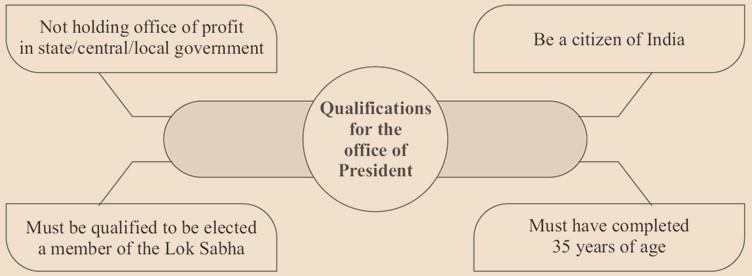
There are specific conditions that govern the President’s tenure in office:
- The President cannot simultaneously be a member of either House of Parliament or of a legislative body in any of the states. If an individual holding such a position is elected President, they are legally considered to have relinquished their previous seat upon entering the Presidential office.
- The President is prohibited from holding any other position that constitutes an office of profit. This reinforces the requirement for independence and undivided attention to the duties of the presidency
- The salary, allowances, and other entitlements of the President are determined by an Act of Parliament. Furthermore, these financial provisions are protected and cannot be reduced during the President’s term of office, ensuring financial security and independence.
Duration of Term, Removal from Office, and Circumstances of Vacancy
- The President’s tenure in office is fixed at a period of five years, commencing from the date they officially assume their responsibilities [i]. Notably, an incumbent President is eligible to seek re-election for another term.
- The Constitution provides a mechanism for the removal of the President from office before the completion of their term. This can occur through a process of impeachment for the transgression of the Constitution.
- The initiation of impeachment proceedings can begin in either the Lok Sabha or the Rajya Sabha.
- For the charge to proceed, it must be supported by a majority of not less than two-thirds of the total membership of the House where the charge originated.
- Once such a resolution is passed in one House, the other House then undertakes an investigation into the charges.
- If, following the investigation, the second House also passes a resolution declaring that the charge has been sustained by a majority of not less than two-thirds of its total membership, the President stands removed from office from the date of the passage of this second resolution.
- A vacancy in the office of the President can arise under several circumstances:
- Through the submission of a formal letter of resignation by the President.
- Due to the unfortunate demise of the President.
- Following removal from office through the process of impeachment.
- Or in other unforeseen circumstances that render the President unable to continue in office.

- In the event of a vacancy in the President’s office, the Vice-President assumes the role of acting President and continues in this capacity until a new President is duly elected. To ensure continuity of the head of state, an election to fill a presidential vacancy must be conducted within a timeframe of six months from the date the vacancy occurred.
The Scope of Presidential Authority and Responsibilities
Executive Powers:
The executive authority vested in the President extends to all matters with respect to which the Parliament has the power to make laws. This signifies a broad scope of executive action.
A key executive function is the appointment of the Prime Minister, who then heads the Council of Ministers. These ministers hold office during the pleasure of the President [i], meaning the President has the prerogative to dismiss them, although this is typically exercised on the advice of the Prime Minister.
The President also holds the power to appoint numerous other high-ranking officials in the Government of India, including:
- The Attorney-General for India, the principal legal advisor to the government.
- The Comptroller and Auditor-General of India, who audits the accounts of the Union and state governments.
- The Judges of the Supreme Court and the High Courts, pivotal figures in the judicial system.
- The Governors of the states, the constitutional heads of the states.
- The Members of the Union Public Service Commission, responsible for recruiting civil servants.
- The Election Commissioners, who oversee the conduct of elections.

Legislative Powers:
- The President is an integral component of the Parliament of India, alongside the two Houses
- The President possesses the authority to summon and prorogue (adjourn) sessions of Parliament and to dissolve the Lok Sabha.
- The President plays a crucial role at the commencement of parliamentary activity by addressing the first session of Parliament following each general election and also at the beginning of the first session of each year, outlining the government’s agenda and policies.
- The President has the power to send messages to either House of Parliament on any matter of importance.
- For certain categories of legislative proposals, the prior recommendation or sanction of the President is a prerequisite for their introduction in Parliament.
- Finally, for a bill passed by both Houses of Parliament to become law, it requires the assent of the President.
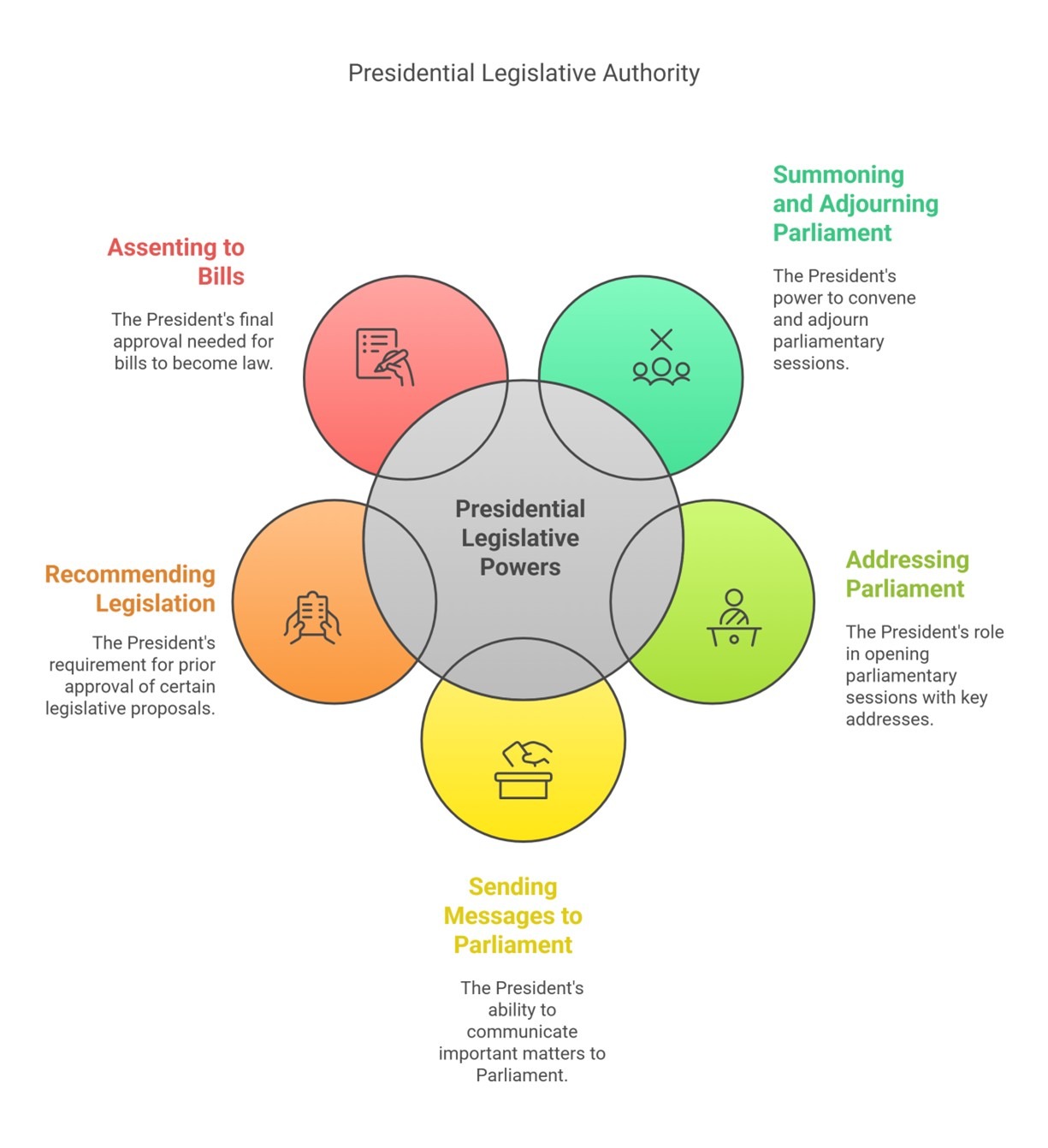
Financial Powers:
- A fundamental aspect of financial legislation is that no Money Bill can be introduced in Parliament except on the prior recommendation of the President [i]. This gives the President a significant role in the initiation of financial matters.
- The President is responsible for causing the Annual Financial Statement (the Union Budget) to be presented before both Houses of Parliament laying out the government’s estimated receipts and expenditures for the upcoming fiscal year.
- The Contingency Fund of India, which is used to meet unforeseen or urgent expenditures, is at the disposal of the President
- To ensure a fair distribution of financial resources between the central government and the states, the President is mandated to constitute a Finance Commission every five years (or earlier if deemed necessary). This commission makes recommendations on the principles governing the distribution of revenues.
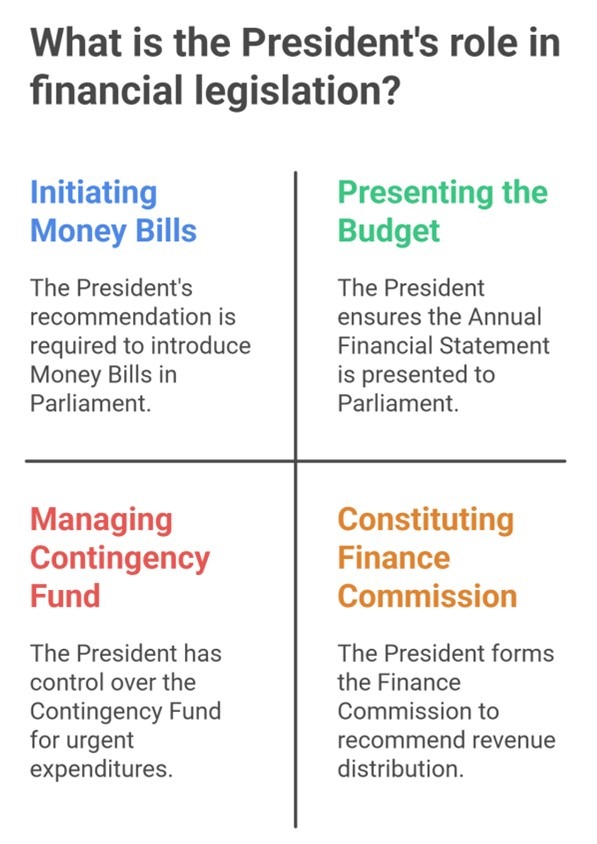
Judicial Powers:
- The President is vested with significant judicial powers, notably the power to grant pardons, reprieves, respites, or remissions of punishment [i]. This includes the authority to suspend, remit, or commute the sentence of any person who has been convicted of an offence in specific circumstances [i]:
- Where the punishment was imposed by a Court Martial (military court).
- In cases involving offences against any law relating to a matter falling within the executive power of the Union.
- In all cases where the sentence is a sentence of death.
The President’s Authority to Withhold Assent to Legislation
The President possesses veto power, which is the authority to withhold their assent from bills that have been passed by both Houses of Parliament.
When a bill is presented for presidential assent, the President has three courses of action available to them:
- They can give their assent to the bill, thereby enacting it into law.
- They can withhold their assent, thus preventing the bill from becoming law.
- In the case of bills other than Money Bills, the President can return the bill to Parliament for reconsideration, suggesting amendments or expressing concerns.

If a bill is returned to Parliament and is passed again by both Houses, whether with or without any amendments, the Constitution mandates that the President must give their assent to it [i]. This limits the President’s suspensive veto.
The President’s Power to Issue Ordinances
- Article 123 of the Constitution grants the President the power to promulgate ordinances. This is a crucial legislative power that can be exercised during periods when Parliament is not in session (in recess).
- Ordinances issued by the President have the same legal force and effect as an Act of Parliament. However, they are temporary in nature.
- The President’s ordinance-making power is subject to specific limitations
- An ordinance can only be issued when both Houses of Parliament are not in session, or when either House is not in session. This ensures that the power is used only when Parliament cannot legislate.
- The President must be satisfied that circumstances exist which render it necessary to take immediate action. This necessitates a degree of urgency for the issuance of an ordinance.
- Every ordinance that is promulgated must be laid before both Houses of Parliament when they reassemble. It will cease to operate at the expiration of six weeks from the date of the reassembly of Parliament, unless it is disapproved by resolutions of both Houses earlier.
The President’s Authority to Grant Pardons and Related Powers
Article 72 specifically outlines the President’s power to grant:
- Pardons, which completely absolve the offender of the crime and its consequences.
- Reprieves, which temporarily suspend the execution of a sentence, often a death sentence.
- Respites, which involve awarding a lesser sentence in place of the one originally awarded, often on special grounds like the physical condition of the offender.
- Remissions of punishment, which reduce the period of a sentence without changing its character.
- The power to suspend, remit, or commute sentences, which allows for changes in the nature or duration of the punishment.
These pardoning powers vested in the President are broader in scope than those granted to a Governor of a state.

The Constitutional Position and Role of the President
- The Constitution of India establishes a parliamentary system of government.
- Within this framework, the President occupies the position of the nominal head of state, also referred to as the de jure (by law) executive
- The real executive power, the authority to make and implement most governmental decisions, is vested in the Prime Minister, who is the de facto (in fact) executive leading the Council of Ministers.
- Generally, the President is expected to act on the aid and advice of the Council of Ministers, with the Prime Minister at its head. This underscores the nature of the parliamentary system where the elected executive wields the primary power.
However, the Constitution also envisages certain situations where the President may be entitled to act in their own discretion, without being bound by the advice of the Council of Ministers. The precise nature and scope of these discretionary powers have been subject to interpretation and constitutional practice.
Impeachment of President
